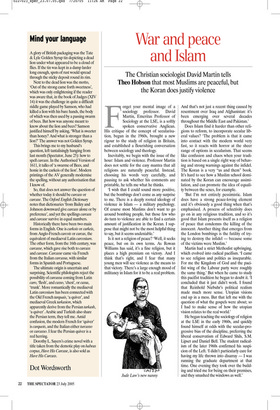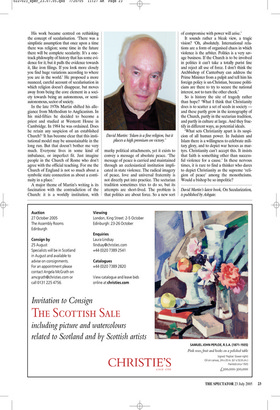War and peace and Islam
The Christian sociologist David Martin tells Theo Hobson that most Muslims are peaceful, but the Koran does justify violence Forget your mental image of a sociology professor. David Martin, Emeritus Professor of Sociology at the LSE, is a softly spoken conservative Anglican. His critique of the concept of secularisation, begun in the 1960s, brought a new rigour to the study of religion in Britain, and established a flourishing conversation between sociology and theology.
Inevitably, we begin with the issue of the hour: Islam and violence. Professor Martin does not settle for the easy mantra that all religions are naturally peaceful. Instead, choosing his words very carefully, and pausing to ask whether his comments are printable, he tells me what he thinks.
‘I wish that I could sound more positive, but the bombings don’t come as any surprise to me. There is a deeply rooted ideology of violence in Islam — a military psychology. Of course most Muslims don’t want to go around bombing people, but those few who do turn to violence are able to find a certain amount of justification in the Koran. I suppose that might not be the most helpful thing to say, but it seems undeniable.’ Is it not a religion of peace? ‘Well, it seeks peace, but on its own terms. As Rowan Williams has said, it’s a fine religion, but it places a high premium on victory. And I think that’s right, and I fear that many young men will see violence as the means to that victory. There’s a large enough mood of militancy in Islam for it to be a real problem. And that’s not just a recent thing caused by resentment over Iraq and Afghanistan: it’s been emerging over several decades throughout the Middle East and Pakistan.’ Does Islam find it harder than other religions to reform, to incorporate secular liberal values? ‘The problem is that it came into contact with the modern world very fast, so it reacts with horror at the sheer range of options in secularism. That seems like confusion and chaos when your tradition is based on a single right way of behaving and strong warnings against the infidel. The Koran is a very “us and them” book. It’s hard to see how a Muslim school dominated by the Koran can encourage assimilation, and can promote the idea of equality between the sexes, for example.
‘But I’m not entirely pessimistic. Islam does have a strong peace-loving element and it’s obviously a good thing when that’s emphasised. A process of selectivity does go on in any religious tradition, and so it’s good that Islam presents itself as a religion of peace that condemns the killing of the innocent. Another thing that emerges from the London bombings is the futility of trying to destroy the infidel — because some of the victims were Muslim.’ Martin had a strict Methodist upbringing, which evolved into radical pacifism. ‘I came to see religion and politics as inseparable. For me the Kingdom of God and the pacifist wing of the Labour party were roughly the same thing.’ But when he came to study this pacifist tradition he began to doubt it. ‘I concluded that it just didn’t work. I found that Reinhold Niebuhr’s political realism made much more sense. Utopian visions end up in a mess. But that left me with the question of what the gospels were about; so I had to make sense of how the utopian vision relates to the real world.’ He began teaching the sociology of religion at the LSE in the early 1960s, and quickly found himself at odds with the secular-progressive bias of the discipline, preferring the liberal conservatism of Edward Shils, S.M. Lipset and Daniel Bell. The student radicalism of the later 1960s confirmed his suspicion of the Left. ‘I didn’t particularly care for having my life thrown into disarray — I was running the graduate department at that time. One evening they took over the building and tried me for being on their premises, and they smashed the windows as well.’ His work became centred on rethinking the concept of secularisation. ‘There was a simplistic assumption that once upon a time there was religion; some time in the future there will be complete secularity. It’s a onetrack philosophy of history that has some evidence for it, but it pulls the evidence towards it, like iron filings. If you look more closely you find huge variations according to where you are in the world.’ He proposed a more nuanced, careful account of secularisation in which religion doesn’t disappear, but moves away from being the core element in a society towards being an autonomous, or semiautonomous, sector of society.
In the late 1970s Martin shifted his allegiance from Methodism to Anglicanism. In his mid-fifties he decided to become a priest and studied at Westcott House in Cambridge. In 1984 he was ordained. Does he retain any suspicion of an established Church? ‘It has become clear that this institutional model may be unsustainable in the long run. But that doesn’t bother me very much. Everyone lives in some kind of imbalance, or imperfect fit. Just imagine people in the Church of Rome who don’t agree with the official teaching. For me the Church of England is not so much about a symbolic state connection as about a continuity in a place.’ A major theme of Martin’s writing is its fascination with the contradiction of the Church: it is a worldly institution, with murky political attachments, yet it exists to convey a message of absolute peace. ‘The message of peace is carried and maintained through an ecclesiastical institution implicated in state violence. The radical imagery of peace, love and universal fraternity is not directly put into practice. The sectarian tradition sometimes tries to do so, but its attempts are short-lived. The problem is that politics are about force. So a new sort of compromise with power will arise.’ It sounds rather a bleak view, a tragic vision? ‘Oh, absolutely. International relations are a form of organised chaos in which violence is the arbiter. Politics is a very savage business. If the Church is to be involved in politics it can’t take a totally purist line and reject all use of force. I don’t think the Archbishop of Canterbury can address the Prime Minister from a pulpit and tell him his foreign policy is un-Christian, because politicians are there to try to secure the national interest, not to turn the other cheek.’ So is history the site of tragedy rather than hope? ‘What I think that Christianity does is to scatter a set of seeds in society and these partly grow in the iconography of the Church, partly in the sectarian tradition, and partly in culture at large. And they fructify in different ways, as potential ideals.
‘What sets Christianity apart is its suspicion of all human power. In Judaism and Islam there is a willingness to celebrate military glory, and to depict war heroes as martyrs. Christianity can’t accept this. It insists that faith is something other than successful violence for a cause.’ In these nervous times, it is rare to find a thinker who dares to depict Christianity as the supreme ‘religion of peace’ among the monotheisms. Would a bishop be so impolitic?
















































 Previous page
Previous page